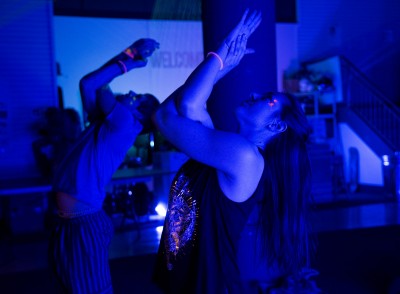
For students and locals alike, Boston is a city is known for its high cost of living and often overpriced amenities. Because of this, affordability often becomes a key player in deciding where to eat, go out and now, where to exercise. This yoga studio wants to change that.
Yoga Hub Boston’s donation-based yoga classes have created a low-cost, local alternative to the pricey yoga studios that seem to pepper the city. The classes are offered three times a week at POP Allston, and while each one has a suggested donation of $10, attendees have the option to donate any amount they can. The classes run purely on donations with no outside income.
Each session has a unique theme: reggae flow on Sunday mornings, candlelit classes on Tuesday nights and glow yoga on Thursday nights.
Ali Singer, the founder of Yoga Hub and the instructor at the POP Allston classes, said making a successful business model requires effective communication with customers.
“I try and make it clear on my website and whenever the classes are promoted exactly what donation-based yoga is,” she said. “It’s not a free class, but the donation base makes it affordable for anyone.”
Yoga Hub offers a casual venue for yoga lovers on a budget. The classes take place not in a studio, but instead in a large, open room that is used for a variety of POP Allston vendors.
Nikki Reyes, a marketing intern at Yoga Hub, said that the class’s calm and welcoming environment is what makes it appealing.
“Typically, a yoga studio charges at least $20 per class, and these classes usually come with other amenities, such as a spa-like bathroom, essential oils and even heated classes,” Reyes said. “The classes that we do at POP Allston are much simpler. Our classes are just a person and their mat. POP Allston is a great space for people to embrace their creativity in more of a relaxed environment.”
POP Allston’s yoga classes started when the business opened in September. The donation forum is a way to attract customers and build the name of the brand within its first year.
Singer said she has consistently changed up her tactics to try to make the donation-based classes as effective as possible. Most customers pay less than the suggested donation, but it varies each class, she said.
“Right now, I just created a new sign-in page where people write down the amount they’re donating, as opposed to people just dropping it in the donation box before or after class,” she said. “I also changed the setup of the room so people have to walk to the back area of the space and sign in before they set up their yoga mat for class. It’s just me alone trying to teach the class and run the space, so it’s not really formal at all, which is fine. This opportunity is less one to make money and more to grow my business.”
By letting customers pick what they pay, Yoga Hub allows them to come and try a class with no pressure. While many larger studios have membership programs and package deals where attendees pay for a fixed number of classes, POP Allston’s informal arrangement allows interested customers to pop in and out of classes at their own convenience.
“I think for now, we need to keep the classes donation-based in order to get people coming,” Reyes said. “Right now, our main goal is to create a reputation in the Boston area and to allow people to try out what we are offering. As the business changes, so will our business model.”
POP Allston’s central, Brighton Avenue location and affordability have attracted many Allston residents to the classes.
Katey Lesneski, a Boston University graduate student living in Allston, started attending the classes when they first started last fall and has been going frequently ever since.
“Yoga classes can be really expensive, and [from] what I’ve heard from my other friends who do yoga around Boston, it’s almost double the price of these classes,” she said. “Here with the donation-based class, it’s really flexible, so you can pop in and out whenever you want. I’m sure for some people, like students who might be low on cash during a certain week, they can still come in and feel like they can give as much money as they can that week, and maybe the next week they could make up for it with a higher donation.”
With the help of Singer’s yoga background and enthusiastic demeanor, each class is both authentic and fun, adding onto the benefits of the low-cost classes.
“I care a lot about teaching,” Singer said. “It’s my life and my career and my passion, but that has nothing to do with donation. My mission with Yoga Hub is to make yoga accessible to a wide audience, and affordability is a big part of it.”
















































































































